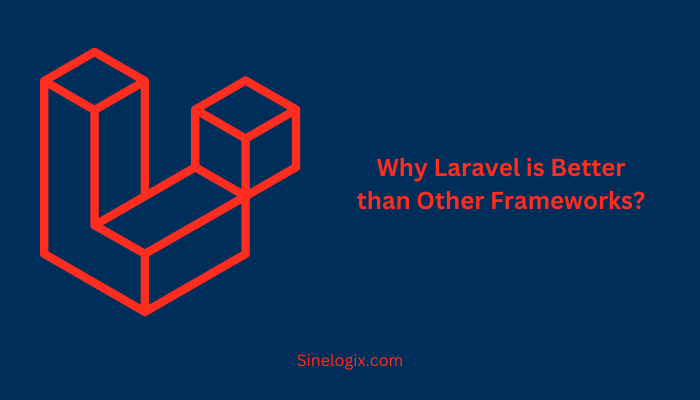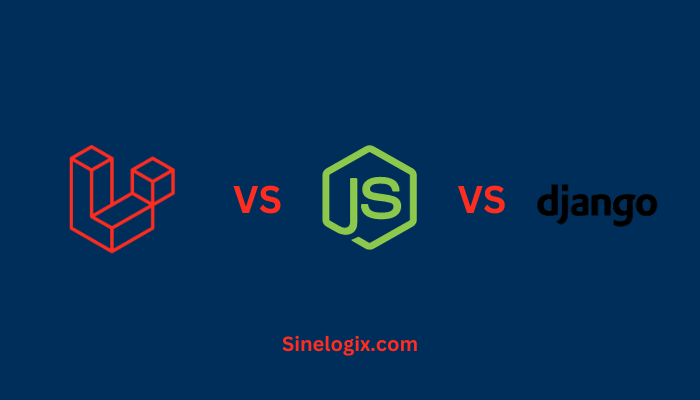In the ever-evolving world of web development, choosing the right framework is crucial. It can make or break your project’s success. Among the plethora of options available, Laravel stands out as one of the most popular and beloved PHP frameworks.
In this article, we will explore why Laravel is better than other frameworks by delving into its key features, robust ecosystem, and the advantages it offers to developers.
Elegant Syntax and Developer-Friendly
Laravel is renowned for its clean, expressive, and elegant syntax, which significantly reduces the learning curve for developers. Its simple and intuitive codebase allows developers to write efficient and maintainable code. Here are a few reasons why Laravel’s syntax shines:
- Blade Templating Engine: Laravel’s Blade templating engine offers a straightforward and efficient way to create dynamic views. It’s intuitive for developers and ensures clear separation between business logic and presentation.
- Artisan Console: Laravel includes a command-line tool called Artisan, which simplifies repetitive tasks like database migrations, model creation, and more. This not only speeds up development but also enhances developer productivity.
- Eloquent ORM: Laravel’s Eloquent ORM provides an eloquent syntax for querying the database. It enables developers to interact with the database using expressive, fluent, and straightforward code.
Powerful Ecosystem
Laravel’s strength doesn’t just lie in its syntax and developer-friendliness; it boasts a powerful ecosystem that offers a wide range of functionalities and packages. Let’s explore some of the essential components:
- Authentication and Authorization: Laravel simplifies user authentication and authorization with built-in features. Developers can easily configure access control lists and permissions.
- Database Migration: Laravel’s database migration system makes it easy to manage and version database schemas. This is a significant advantage when it comes to team collaboration and scaling projects.
- Caching: Laravel offers robust caching mechanisms to improve the performance of web applications. It supports various cache drivers, making it adaptable to different project requirements.
- Queue System: Laravel’s queue system simplifies the execution of tasks in the background. This is essential for handling time-consuming operations, such as sending emails, without affecting the user experience.
- Testing: Laravel comes with testing tools for both unit and feature testing. This ensures the stability and reliability of applications.
Built-In Security Features
Laravel prioritizes the security of web applications. It incorporates various security features and best practices to protect against common web vulnerabilities, such as SQL injection, XSS, and CSRF attacks. Here’s how Laravel excels in this aspect:
- CSRF Protection: Laravel automatically generates CSRF tokens for each active user session, reducing the risk of cross-site request forgery attacks.
- Authentication Scaffolding: Laravel provides pre-built authentication scaffolding with secure default configurations, making it easy for developers to set up user registration and login.
- Password Hashing: Passwords are never stored as plain text. Laravel hashes passwords using the bcrypt algorithm, ensuring robust security.
- Authorization Policies: Developers can define authorization policies, controlling access to resources, and ensure that only authorized users can perform specific actions.
Community and Documentation
One of Laravel’s strengths is its active and supportive community. Laravel has a vast user base, which means you can easily find solutions to common problems and access a wealth of knowledge through forums, tutorials, and documentation. The official documentation is well-maintained and covers every aspect of the framework comprehensively.
Continuous Innovation
Laravel’s creator, Taylor Otwell, is dedicated to pushing the framework’s boundaries and continuously improving it. This commitment to innovation keeps Laravel up-to-date with modern web development practices and technologies. Laravel evolves with the industry, making it a reliable choice for long-term projects.
Integration and Libraries
Laravel seamlessly integrates with numerous third-party libraries and services, thanks to its robust package manager, Composer. This means you can extend your application’s functionality effortlessly by leveraging existing packages, reducing development time and effort.
Blade Templating Engine
Laravel’s Blade templating engine is a standout feature that significantly simplifies the process of building dynamic views. It offers a simple yet powerful syntax for creating templates.
Blade templates are compiled into plain PHP code, making them fast and efficient. Furthermore, Blade templates allow you to reuse and extend layouts, improving code maintainability and reducing redundancy.
Eloquent ORM
Eloquent is Laravel’s elegant and intuitive Object-Relational Mapping (ORM) system. It allows developers to work with databases using an expressive and fluent syntax.
Eloquent provides an active record implementation, enabling developers to define and interact with database tables using simple and intuitive code. With Eloquent, complex database operations become straightforward, and the risk of SQL injection is significantly reduced.
Extensive Documentation
Laravel’s official documentation is comprehensive and well-maintained. It covers all aspects of the framework, from installation to advanced topics.
The clear and detailed documentation is a valuable resource for both beginners and experienced developers. It includes code samples, explanations, and best practices, making it easy to learn and use Laravel effectively.
Rapid Development with Artisan
Laravel’s Artisan command-line tool is a powerful utility that simplifies various development tasks. It automates common, repetitive operations, such as generating code scaffolds, managing database migrations, and running tests.
This automation not only saves time but also ensures consistency and reduces the likelihood of errors in your codebase.
Active Community and Ecosystem
Laravel has a vibrant and active community of developers, which results in a vast ecosystem of packages and libraries. The Laravel community contributes to the framework’s growth by creating and sharing open-source packages that extend its functionality.
This rich ecosystem means that developers can easily find and integrate packages to address specific project requirements, enhancing productivity and project efficiency.
Robust Routing System
Laravel’s routing system is both flexible and powerful. It allows developers to define routes for handling HTTP requests with ease.
You can create RESTful routes, apply middleware, and even use named routes, making the process of defining and managing routes extremely convenient. This flexibility in routing simplifies the creation of clean and organized URLs for your application.
Middleware for Custom HTTP Request Handling
Laravel’s middleware allows you to filter and handle HTTP requests entering your application. This feature is incredibly useful for tasks such as authentication, logging, and input validation.
Middleware can be customized to suit your application’s specific needs, giving you fine-grained control over the request-response cycle.
Laravel Mix for Asset Compilation
Developers often need to compile and manage CSS and JavaScript assets for their web applications. Laravel Mix is a powerful tool that simplifies asset compilation and versioning.
It supports popular CSS and JavaScript preprocessors, including SASS and Less, and allows you to easily manage asset dependencies.
Task Scheduling
Laravel’s task scheduling simplifies the execution of periodic tasks, such as sending email reminders or performing maintenance jobs.
With the built-in task scheduler, you can define commands to run at specified intervals, reducing the need for manual intervention and improving application reliability.
Real-time Broadcasting with Laravel Echo
For applications that require real-time updates, Laravel offers integration with broadcasting services like Pusher. The Laravel Echo package provides an elegant and simple way to create real-time, event-driven applications. This is particularly valuable for chat applications, notifications, and live dashboards.
Queues and Job Management
Handling time-consuming tasks asynchronously is essential for maintaining a responsive user experience. Laravel’s built-in queue system makes it easy to manage and execute tasks in the background.
It can work with various queue drivers, such as Redis and Amazon SQS, giving you flexibility in managing background jobs.
Localization and Internationalization
If your application needs to support multiple languages and regions, Laravel provides excellent support for localization and internationalization.
You can easily create language files, translate content, and format dates, numbers, and currency based on user preferences, making your application accessible to a global audience.
Artisan Tinker
Artisan Tinker is a powerful feature that provides an interactive command-line interface for your application. With Tinker, you can interact with your application’s code and data, making it a valuable tool for debugging and testing.
You can experiment with your application’s functionality and test code snippets before incorporating them into your project.
Flexible File Storage
Laravel supports multiple file storage options, including local disk, Amazon S3, and even custom storage solutions. This flexibility enables you to manage file uploads, storage, and retrieval in a way that best suits your project’s needs.
These were the reasons that make Laravel better than others and with our Laravel development services you can take all advantage of Laravel developed website.
Related Articles:
Conclusion
Laravel’s numerous advantages, such as its elegant syntax, powerful ecosystem, robust security features, active community, and continuous innovation, make it a top choice for web development.
It simplifies the development process, enhances code maintainability, and ensures the security of web applications.
Whether you’re a beginner or an experienced developer, Laravel’s intuitive features and extensive documentation make it an excellent choice for a wide range of web development projects.
When compared to other frameworks, Laravel’s comprehensive offerings, along with its ease of use, set it apart as the preferred choice for developers seeking a framework that combines productivity, security, and flexibility.




